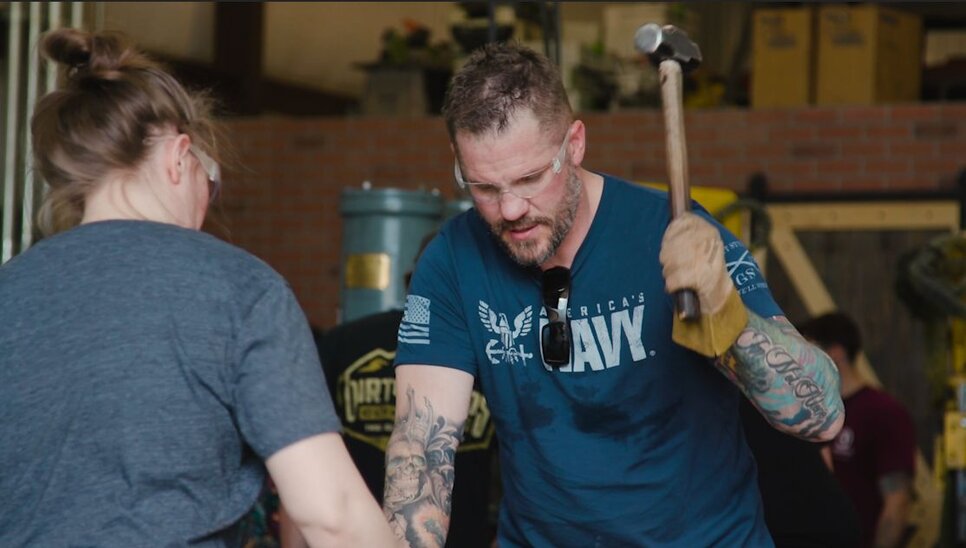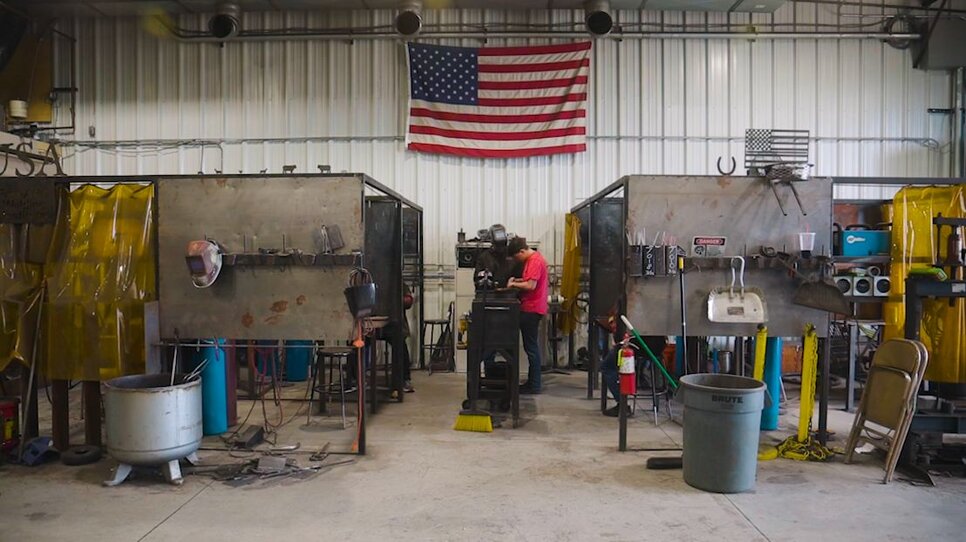Fighting PTSD with fire and steel
share

COLORADO SPRINGS, Colo. — Amid a shower of sparks and stinging steel hammers, a collection of military veterans forged metal hardware discovering a newfound sense of peace in the process.
More than a dozen military veterans, all suffering from Traumatic Brain Injuries (TBI) or Post-Traumatic Stress Disorder (PTSD) gathered at Kilroy’s Workshop to participate in a recovery blacksmithing and welding program.
Through guided knife and damascus making, participants — alongside any accompanying family members who cared to join — aimed to alleviate their symptoms.
Green served in the Navy from 2001 to 2007. He was deployed four times, beginning in South and then Central America for counter-narcotics and anti-piracy, before shifting to Iraq and finishing in wargames.
“[Blacksmithing] is more a stress reliever for me,” said Kage Green, a U.S. Navy veteran, speaking on the workshop’s manual labor and community-building.
“You’re hitting something, pounding something… while getting to keep the creative side of my mind working.”

He was released on medical discharge after suffering a close skull fracture with traumatic brain injury. Since leaving the military, Green continues to suffer from lingering effects of his TBI, including near daily bouts with a lack of impulse control and memory issues.
“Our mission is to help people heal,” said Bob Adwar, the founder and CEO of River Deep. “Our mission is to help slow down the suicide rates and to keep families together.”
Green underlined another common side-effect, one which affects many of the those suffering from TBI and PTSD: antisocial behavior.
“You become antisocial, you withdraw, and that’s counterproductive to addressing your mental health issues,” he said.
“For years, I was just in denial, and I’d deal with it in all the wrong ways.”
He first found relief through the support of Operation TBI Freedom, a veteran’s and active-duty care mental health program hosted through Craig Hospital. There, Green was able to find more information, resources and other organizations helping those battling TBI and PTSD.
This is how he discovered the River Deep Foundation, a veteran’s services nonprofit that offers a variety of activity-centered outings to retired or discharged military members and their families.
The outings aim to alleviate existing physical and mental health difficulties through physical activity and community building, all intended to construct a larger support network for both veterans and their families.

According to the US Department of Veterans Affairs, about 5-7% of US Veterans suffer from PTSD in their lifetime, and a 2021 study found that veterans suffering from PTSD were three times as likely to report “hopelessness or suicidal ideation.”
A 2023 report published by the US Department of Veterans Affairs found that suicide is now the second-leading cause of death for veterans under the age of forty-five.
Adwar emphasized that the effects of TBI and PTSD extend beyond the individual as well.
“We talk about suicide rate… but we don’t talk as much about the divorce rate and families falling apart because of PTSD and TBI,” said Adwar. “If you’re in crisis, your family is in crisis.”
Now more than two-decades old, the River Deep Foundation has a calendar full of family-friendly events organized in partnership with a variety of businesses statewide. Outings range from art classes to scuba diving to fly fishing.
In order to make each activity as accessible as possible, River Deep has worked with schools like the University of Colorado, Boulder to build adaptive sporting equipment to accommodate veterans of differing abilities.
Their gear list includes a mount for adaptive clay shooting and a specialized fishing rod for comfortable adaptive fly fishing.
Thirteen people [form Kilroy’s Workshop] have gone on the History Channel’s Forged in Fire, according to Hardman.
Chase McCleary is a multimedia journalist at Rocky Mountain PBS. Chasemccleary@rmpbs.org
Through their partnership with Kilroy’s Workshop, a local metalworking shop in eastern Colorado Springs, Adwar and Ron Hardman, the workshop’s founder and lead instructor, have developed ways for those with physical and mental limitations to participate in blacksmithing and welding as well.
“I’ve just seen some of these folks come out of their shell where traditional therapies didn’t necessarily work,” said Hardman.
He described one veteran attendee who suffered from tremors.
“[The veteran] found that when he hammered, his tremors stopped,” said Hardman. “And then when he stopped hammering, they came back. So he got himself a forge at home.”
Hardman started Kilroy’s Workshop a little over a decade ago out of an airplane hangar. Since then, the operation has grown to a 15,000 square foot warehouse and has become a prime location for young metalworkers looking to learn the craft.
And maybe break into television along the way.
“I won in Season Seven, Episode Twelve… with my daughter,” said Hardman. “It was epic.”
Kilroy’s has also become a regular destination for veterans’ services groups, including the River Deep Foundation, Operation TBI Freedom and the Wounded Warrior Project, looking to partner on restorative trainings and workshops for service members with mental health issues.
“We’re taking something, transforming it and morphing that into something else. And that act alone, just being able to take something and make something… it’s just transformational,” said Hardman.
As beneficial as forming small knives or damascus — a type of patterned modern steel forged through layering – can be, both Hardman and Green echoed that the forming of a new social community was equally as, if not more, important for participating veterans.
“A lot of people withdraw… where you feel like you don’t have any friends, nobody cares about you…” said Green, “and then you become part of this community, and everyone’s compassionate with each other and empathetic with each other.”
“We say we make metal things here at our shop, but our product is people and community,” said Hardman.
For more information on resources for veteran’s suffering from TBI and PTSD, visit the US Department for Veterans Affairs website.
